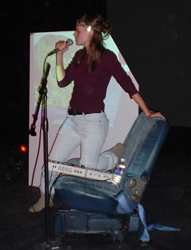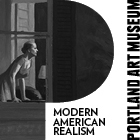
|
||
|
Portland art blog + news + exhibition reviews + galleries + contemporary northwest art
|
||
Tracy + the Plastics 
Wynne Greenwood took the stage at the Works last Tuesday performing in her cyborg/ multiple selves/ lo-fi band Tracy + the Plastics. She came on in ugly white pants and sheepskin boots and spent a few moments adjusting her gold headband before turning on the microphone and the single synthesizer. She asks that the lights be dimmed and starts arranging the audience: "Can't we make a less hierarchal space in here? Why don't you guys sit down?" Wynne plays Tracy, the bandleader and vocalist and she is joined by 2 other projected versions of herself, Nikki and Cola. In Culture for Pigeon, Wynne's recently released album and dvd, we see Tracy, Nikki and Cola lightly arguing during a rehearsal. Does the band name need to be changed? Doesn't Tracy + the Plastics support corrupt male hierarchal structures in rock music by presenting Tracy as the leader and most important band member? What is that thing? Does anyone else see that thing? Wynne's video projection/ performance on Tuesday developed some new experiences for the band as they traveled listlessly between shows on tour. A full set of new songs (is there a new album?) was interspersed with dialogue. Wynne sat on a bus seat on stage and talked with her other selves. Most of the conversation was spaced out/ staring out the window/ not really paying attention/ road-trip banter. The words seemed less important than the spaces between the words. Wynne's work slows down narrative, pries open the cognitive framework of dialogue until there is very little there. Wynne's goal is to create an open space, a tear in the fabric of culture in which the complex, constructed identity of the individual has room to exist. The dialogue bores you, makes you laugh, makes you feel spaced out, until you are wondering what you are doing there, or thinking about something else. Finally, although you are still watching the performance, your attention has become entirely introspective. At this point Wynne interrupts herself in the middle of the song she is singing, turns off the beat loop on the synthesizer, and takes the rare occasion to stop lounging on the bus seat and walk up to the front of the stage to address the audience. "Why did you come here?" The audience responds variously: "To see you!" "For Art!" "For Art!" "TBA!" Wynne's reply: "I don't know, I think I'm talking to the people that aren't saying anything!" It seems clear suddenly, that she is attacking the power structure of the performance itself. Why did you come here? Why did you consider anyone more important to listen to than your own voice? If you take your cues from Wynne, you will multiply your identity, talk to yourself, sing to yourself. Make yourself less effective and more complicated. 
With the lights dimmed, the music off, and Wynne still standing at the front of the stage before a seated audience, she slips into the most daring, simplest, and most heartbreaking song I've ever heard. It is a simple, tuneless repetition, a slow chant, like a campfire song that never gets to the chorus. There is no music, no melody, only Wynne herself, onstage in the darkness, pleading with the audience: Why don't you love yourself a little more? Why don't you love your life a little more? Why don't you love your wife a little more? Why don't you love husband a little more? Why don't you love each other a little more? Why don't you love each other a little more? Soon she runs out of lyrics and says: "Anna, can you come up here and think of anything?" And Anna takes the microphone and does a few more verses off the top of her head. Posted by Isaac Peterson on September 21, 2005 at 1:45 | Comments (4) Comments (can i make a formal complaint about this registration system? the whole "signing in" thing is huge barrier to entry) i thought when she asked "Why did you come here?" and then said, "I don't know, I think I'm talking to the people that aren't saying anything!" she was talking to all the loud chatter-monkeys in the back of the place. that's not what you got? also, it felt like it sort of didn't work. people kept chatting, loudly, during the performance. and then she exited abruptly (early?). Posted by: kmikeym I didn't think she was talking about the chatter monkeys, I thought it was part of her performance, but it did seem strange and jilted. It did feel like her performance "didn't work" but I feel like that is the point of her art: that culture at large "doesn't work" Culture is a hyper-dense network of signifiers which refer only to each other. Culture at large is a closed loop in which an individual with a complex self-constructed identity (Tracy) cannot participate. There isn't the space. Culture provides no signifier for the possibility and mystery of the individual mind/ soul/ spirit. It is instead concerned with making existence less complicated and more efficient. The strangeness of joy is reduced to cliche American idiom of "happiness." The labyrinthine elegance of melancholy is reduced to "sadness." Culture senses that these attributes are related to one another in a duality. Whenever duality is present, culture seeks to identify the less effective quality (in this example, "sadness") and identify it as undesireable. The next step is to capitolize on these identifications. We market products (and I believe this speaks to all products) which will increase the efficiency of personality. Products which will make you less "sad" and more "happy". Breath mints/ coke/ chewing gum/ plastic bags/ pork rinds/ tennis shoes/ whatever. Wynne's work is about creating complications in this system until it no longer works, until it slows down, until its margins and useless areas are exposed. And these are the areas in which the complex individual can feel comfortable. That what she was doing on tuesday, creating a comfortable space for the complex individual. Maybe she did get upset with the chatter-monkeys and walk off short, and maybe she was trying to get people to be quiet when she asked them "Why are you here?" but for me it just fed in to her goals as an artist anyway. Her work always feels awkward, and always feels like it "doesn't work". To me that is the point: Feeling awkward in a culture which prizes efficiency to the point of psychosis. Feeling like your personality "doesn't work" within culture. Being forced to choose between the efficiency of culture and the strangeness of your own personality, Wynne chooses the latter and multiplies it, embellishes it, expands it, in all of its awkwardness and complex inefficiency. Posted by: Isaac hey isaac, thanks for the response! this was my first time seeing tracy + the plastics, so i don't have much reference. so culture "works" by sort of pre-defining an experience? you buy a product because it WILL make you happy, not because it DOES make you happy... but is that our (america?) culture, or just culture in any form? i'm not sure i'd agree that culture provides no signifier for the possibility and mystery of the individual spirit, because culture itself is very complex. it seems like when you say culture you infer american consumer culture, is that right? that i could definitely buy into (heh). but culture as a... thing, as the beliefs of a society or characteristics of a group, well, i think that can allow in many circumstances for the opportunity to express a complex individual sense of self. has wynne talked about this at all? i'd be interested to hear how she describes her art. Posted by: kmikeym I too felt that the show end early, and too soon. I felt for sure that she was speaking to the chatter monkeys in the rear of the room. In what was a very simple, nice, uplifting song, was "Why don't you love this Space just a little more?" This was to me a clear indication of her... uneasy feeling of the space, or just her plain upset reaction to an enormous group of people talking loudly during her performance. And rightly so. But I, like a whole bunch of people were very curious to see Tracy + the Plastics, and had only come across "them" in print or word of mouth, so this very short performance is more comfortably accepted by me if she was pissed of about the noise. On the other had I felt ripped off for the $$$ I and my gaggle spent to see a 18min show. Isn't culture itself the signifier "for the possibility and mystery of the individual mind/ soul/ spirit" I feel like all people are complex and most have a conflicted sense of self. This conflict may be in part due to Sesame Street values that we would really like to live by and that would be steps towards a society of equal, however in capitalist culture Sesame Street must take a back seat to the bottom line, and status. Until the time comes when Sesame Street values out weight capitalist culture in mass media we will continue to loose sight of equal, for the pursue of statues. Posted by: maCk Post a comment Thanks for signing in, . Now you can comment. (sign out)
(If you haven't left a comment here before, you may need to be approved by
the site owner before your comment will appear. Until then, it won't appear
on the entry. Thanks for waiting.)
|
| s p o n s o r s |
 |
 |
 |
 |
 |
 |
 |
 |
 |
 |
 |
 |
 |
 |

|
Site Design: Jennifer Armbrust | • | Site Development: Philippe Blanc & Katherine Bovee | |


![[TypeKey Profile Page]](http://www.portlandart.net/nav-commenters.gif)